The following article was written by Sara Mashayekh, an English-Persian translator and PhD student in the department of Theater and Dance at the University of California, Santa Barbara, where she works on performability of medieval Persian texts. Follow Sara on twitter @sara_mashayekh.
During the recent protests in Iran, a song called Baraye by singer/songwriter Shervin Hajipour became famous among protesters both outside and inside Iran. The title, Baraye, means “because of” or “for the sake of” in Persian and it is the word that starts every verse of the song. The song was composed during the early days of the 2022 uprising and soon became the anthem of the movement. It was first posted by the singer himself on his Instagram page and quickly went viral. Since then, it has gained international fame and in February 2023 won a Grammy Award in the category “Best Song for Social Change.” The song is regularly sung by protesters and its lyrics have been turned into slogans of protest, chanted or written on banners and walls of public buildings inside Iran. The lyrics are reflective of Iranian society at present, offering insight into the current uprising, why it started, and the general atmosphere of the movement. Baraye is a guide into modern Iran, its problems, and the demands and aspirations of its people.
Until now, Baraye has not been translated by a professional translator. But language is not the only barrier. One could understand the Persian lyrics and still not completely understand what the song’s spirit and content is about. There is so much context in every line of this song and it must be unpacked for the reader to understand its message. As a translator of academic and non-academic works between Persian and English, I have been fascinated by the multifaceted meaning of the lyrics and how they are used in the song, as well as the tweets from which they were originally taken. As a PhD Student of theater & performance studies who regularly works with complicated medieval and modern texts, I am used to dissecting words and unpacking their meanings, particularly in an artistic setting. Unpacking the lyrics of Baraye can help us see the situation from the viewpoint of the people whose grievances this song reflects. In the following, I offer a line-by-line translation & commentary of the lyrics of this song, providing secondary meanings and their context after each line.
Before starting with the lyrics, however, some general information about the events that resulted in this song’s composition is necessary. On 16th of September 2022, a 22-year-old Iranian woman named Mahsa “Jina” Amini, died in Kasra hospital in Tehran, Iran under suspicious circumstances. Born and raised in Saqqez in Kurdistan province of Iran, Mahsa was visiting Tehran with her brother when the Gasht-e Ershad (morality police) arrested her for not wearing her hijab correctly. Less than two hours later, she was rushed to the hospital already in a coma, and died the next day. Law Enforcement claims that while in police custody, she suffered a heart attack, collapsed, and fell into a coma. However, eyewitnesses, including women who were detained with Amini, said she was beaten, and that she died as a result of police brutality. Images of her in the hospital bed and the video footage of her while in police custody quickly went viral.
As early as 24 hours after her death, protests had erupted in various locations in Iran, including the capital Tehran as well as in Kurdistan, her home province. As protests broke out across Iran, a challenge was proposed by several Persian-speaking Twitter users from around the world: write a few lines, as long as a tweet, about why Iranians are protesting. Users responded with tweets on a variety of issues and problems they were facing as a result of regime policies or what they believe the government is responsible for. The text of the challenge started with the interrogative chera – “why” and the responding tweets all started with the Persian word barā-yé “for the sake of” or “because of.” For more than 48 hours, an overwhelming number of Twitter users were writing tweets starting with baraye and listing all that they believed is wrong with Iran today.
A lot of these tweets were initially about universal issues and don’t need much explanation, such as “because of all the political prisoners,” “for the sake of liberty,” “for the sake of justice,” “because of all the students who were expelled from university for having unacceptable political leanings,” or “for the sake of women,” which are easy to understand. Then, they started becoming a little more specific, addressing more than just political grievances and shifted to include social issues such as those that have become emblematic in Iran because of mismanagement and corruption. Animal rights, environmental issues, refugee rights, gay and lesbian rights, quickly found their way into the tweet pool. Some examples are “because of this polluted air,” “because of the trees that are dying,” “for the Afghan (refugee) kids.” The tweets were indeed becoming more poignant and specific and resonated with an even larger audience.
25 year old Shervin Hajipour chose 29 tweets out of millions posted online and turned them into the songs’ lyrics. Haipour was already nationally famous following his participation in the Iranian talent show Asr-e Jadid (New Era). After composing the accompanying music, he sang his song in his room and posted it on his Instagram page. The song was viewed 40 million times on his Instagram page alone. A few days later, on September 29th, he was briefly arrested and released later on October 4th, 2022. He was forced to delete his Instagram post, but by that time, the video clip had been downloaded, shared many times, and gone viral already. Thus follows some of the song’s most notable lines.
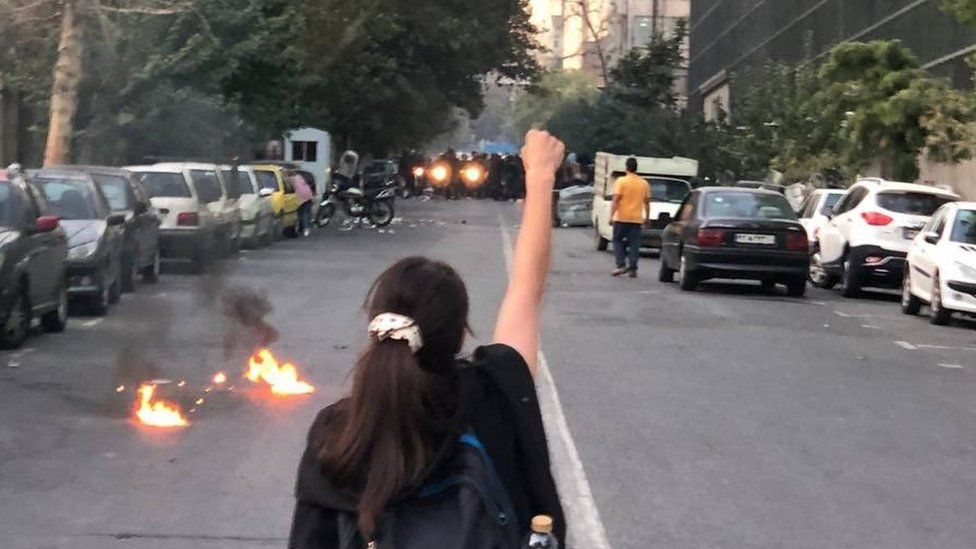
For dancing in the street / برای توی کوچه رقصیدن
This is the first line of the song and it is very reflective of many Iranians’ yearning to be able to do something as simple as dancing in the street. Public dancing is forbidden in Iran, especially for women. Under certain circumstances, men are given permission to perform ethnic dances during cultural festivals or certain occasions. However, dancing is strictly forbidden in public spaces and is not shown in films or TV programs. The law is vague since the act of dancing itself is not illegal, for men or women, but since the 1979 Revolution, public dancing has been labeled as indecent and is punishable by law.
Because of the fear we feel when we kiss / برای ترسیدن به وقت بوسیدن
This line too speaks of an activity, kissing, which is not considered legally suitable for the public sphere. Kissing, even between legally married heterosexual couples, is frowned on outside of the private sphere. There is no law preventing a couple from kissing, be it in public or private. However, due to the label of “indecency”, such an act can be considered a crime.
Because of our sisters, mine, and yours / برای خواهرم، خواهرت، خواهرامون
This line has been one of the most quoted lines of this song, understandably since women’s rights is the most important force behind the current movement. The uprising started with the death of a young woman and the way her dress was conceived by the morality police as inappropriate. Aside from the tragic consequences of her arrest, the fact that she was arrested in the first place is itself a testament to the ongoing, everyday lack of bodily autonomy for women in Iran.
For wanting to change these rotten minds / برای تغییر مغزها که پوسیدن
Many oppressive laws and practices in Iran are based on dogmatic views held by politicians, who often espouse them as part of their reading of orthodox Islam. Attempts at reforming existing laws to make them less oppressive for women and religious minorities have been blocked by conservatives armed with an unshakable faith.
However, there might be another layer of criticism at work in the lyrics : male chauvinism. The original tweet was tweeted on September 24th as a response to another tweet which talks about the villainization of female survivors of rape, sexual assault, and harassment. Given this, “the rotten minds” might not necessarily be a reference to religious conservatism but to male chauvinism at large.
Because of the shame of poverty / برای شرمندگی، برای بی پولی
This line is a shorter version of a tweet which reads: “for that father whose back is broken under the weight of his problems and is ashamed of his poverty in front of his family.” While poverty is a universal issue, both the original tweet and Hajipour’s edited use of it refer directly to government mismanagement of the economy. There has been an unprecedented rise in poverty during the past few years in Iran, despite oil wealth and other resources many Iranians believe the government has mismanaged.
For longing to have an ordinary life / برای حسرت یک زندگی معمولی
This is possibly the most important line of this song. This line captures its essence: that Iranians want to live their lives in peace without having to worry about being arrested or worse for the way they dress, the way they behave, etc. While civil disobedience has long been a method of resistance around the world, Iranian protesters’ demands for civil liberties are considered basic rights in much of the world, particularly as it pertains to social freedom. Therefore, “longing to have an ordinary life” is really the most important message here, not only of this song but the movement as well.
For the garbage-scavenging kid and her dreams / برای کودک زباله گرد و آرزوهاش
In Iran, it is a relatively new phenomenon to see people, especially children, digging in rubbish bins. This is related to large scale migrations to big cities in recent decades and the lack of social welfare protections for many recent arrivals, who end up destitute. Underage workers who live and work in these terrible conditions are often abused in a variety of ways by their employers, and have come to symbolize the growing impoverishment of Iranian society and vulnerability of its weakest members.
Because of this dictatorial economy / برای این اقتصاد دستوری
This line is one of many that is difficult to accurately translate. The original tweet by Reza Shoohani says: “for planned pricing, for the administration interfering in economy. For nonsense phrases such as ‘Islamic Economy’ and ‘Resistance Economy.’” The line used by Hajipour uses the phrase eghtesad-e-dastoori which is usually translated as “planned economy” but “dictatorial economy” could be a more accurate translation. While planned economies exist in many societies and countries, in Iran, restrictions imposed on economic actors are often influenced by the government’s ideology and the economic interference of the state-controlled Revolutionary Guards, hence the reference to ‘Islamic Economy’ in the original tweet. This line connects in meaning with the earlier line about poverty.
Because of this polluted air / برای این هوای آلوده
Air pollution is a major issue in Iran. Tehran is one of the most polluted cities in the world with cold seasons being the worst. In 2021, Iran was ranked 24th most polluted country among 118 countries listed. Environmental changes have played a role in the worsening quality of the air in Iran but government policies such as “lack of regulations on [supply of] standard diesel,” have been seen as major reasons behind the unacceptable air quality in Tehran and cities all over Iran.
Because of the dying trees of the Vali Asr street / برای ولیعصر و درختای فرسوده
The tree lined Vali Asr street of Tehran is the longest street in Iran, connecting the railway station in the south with Tehran’s northernmost part, Tajrish Square. Originally named Pahlavi Street, Vali Asr, and its iconic chinar trees, are often seen as one of the symbols of Tehran. In recent years, however, due to mismanagement and perhaps sabotage, many of the trees on Vali Asr started dying and were cut down by the municipality.

Because of the cheetah cub Pirooz who might go extinct / برای پیروز و احتمال انقراضش
Pirooz, meaning Victor, is the name of an Asiatic cheetah cub that is part of a program to preserve endangered species. His mother was rescued from wildlife traffickers and was taken to a facility where she eventually mated with a male cheetah and gave birth to three cubs. Only one, Pirooz, survived and he is still too young to be left on his own. Asiatic cheetahs used to live all over central Asia and the Middle East, but today are only found in Iran and their survival has become a national issue. Members of the Iranian national soccer team wore a jersey with the image of the Asiatic cheetah to the 2014 and 2018 soccer world cups.
Because of the innocent stray dogs / برای سگ های بی گناه ممنوعه
In Iran, similar to many other countries, stray dogs are collected and taken off of the streets, usually to shelters. In 2021, however, a report was published that due to shelters being overcrowded or because of a budget cut, several shelters were forced to kill the dogs housed there. Reports of municipality agents shooting and killing dogs in a shelter was reported by the Iranian media. Animal rights activists and regular citizens were enraged and demanded answers. While animal abuse is a problem in Iran when it comes to a variety of animals dogs usually attract more attention. According to some Islamic traditions, dogs are considered impure. While keeping dogs, mostly for protection, has always been common in Iran’s rural areas, dogs were not common in cities until the 20th century. People keeping dogs as pets in their houses in Tehran and other big cities is often seen as a phenomena resulting from westernization and secularization. There are no official ban on dogs, but there has been occasional clashes between dog owners and the police. Religious dogma is seen as the reason behind the crackdown on dogs, which is why dogs are referred to as “forbidden” in this song.
Because of our non-stop tears / برای گریه های بی وقفه
The original tweet by Khanoomeh Anonymous is slightly different from the line recited here. The original tweet says: “Because of our non-stop tears during these nights”, talking about the current uprising, people being anxious, mourning those protesters who have been killed, and worried about those who have been arrested and are in jail. By omitting the last part of this phrase, during these nights, Hajipour has given a new meaning to this line. In his song, the tears are not related to a specific event and can be in response to any, or all, of the problems mentioned in this song.
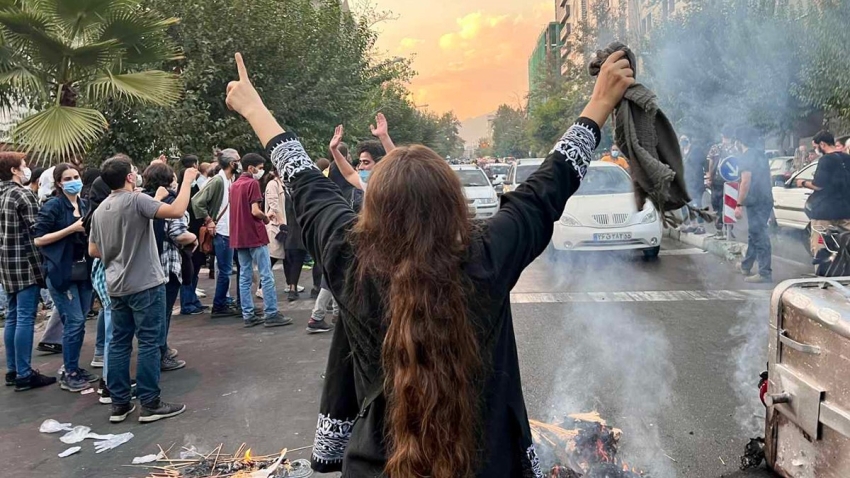
For the image of this moment repeating again / برای تصویر تکرار این لحظه
This line is perhaps the most complex line of this song. It is a modified version of the original tweet by Gorg-e-Wall Street (The Wolf of Wall Street) which reads: “for the yearning you placed in a father’s heart to repeat this moment.” The text is accompanied by a picture of Iranian activist Hamed Esmaeilion and his young daughter, Reera Esmaeilion, sitting together and reading newspapers. Nine year old Reera Esmaeilion and her mother, Parisa Eghbalian, were killed when Iran’s Revolutionary Guards shot down a Boeing 737-800 operated by Ukrainian International Airlines, headed from Tehran to Kyiv, on January 8th 2020. Since the tragic accident, Esmaeilion has devoted his life to finding justice for the victims and as a result has become a household name among Iranians.
For the sake of a laughing face / برای چهره ای که می خنده
This line looks rather simple and easy to understand. The singer is wishing for laughter and happiness. Once again, however, the original tweet tells us that there is a deeper layer here. The original tweet by Sachli says: “for the day when our profile pictures are our own images with smiles on our lips.” This is a reference to the fact that many underground activists and citizen journalists inside Iran use pseudonyms for their Twitter, Facebook, and Instagram accounts in order to protect themselves against government agents who monitor social media sites.
Because of the students, for the future / برای دانش آموزا، برای آینده
This is one of most universal lines of this song and it doesn’t need much explanation. It is saying: for the well-being of students and their future.
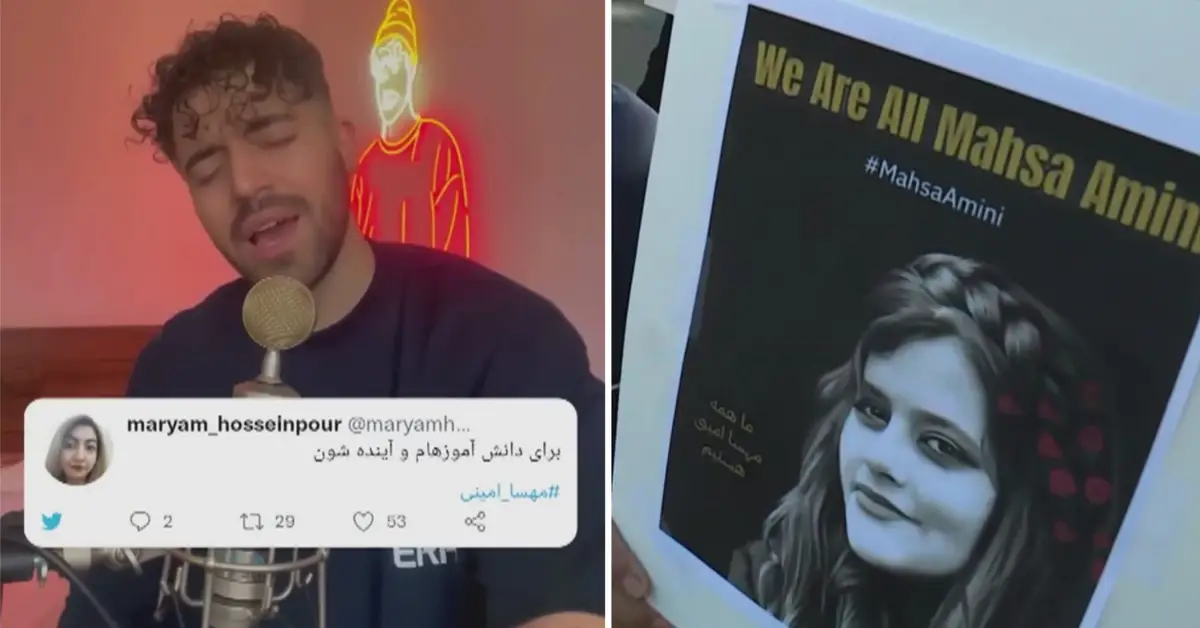
Because of this mandatory paradise / برای این بهشت اجباری
This line is an unveiled reference to the fact that the religious establishment in Iran often justifies the restrictions it imposes on Iranian citizens, women in particular, by saying that they are preventing sinful behavior and are creating an ideal society that resembles paradise. In 2014, Hassan Rouhani, then president of Iran who held reformist views, argued that the government is not responsible for preventing people from committing sin and should not be in the business of sending people to paradise by force. He was subsequently attacked by conservative officials including several members of the parliament who argued that the main purpose of an Islamic government is to guide people, if necessary by force, toward paradise.
Because of imprisoned experts / برای نخبه های زندانی
The Persian word used in this phrase, Nokhbeh, is often translated as elite. However, in this case the imprisoned Nokhbeh is a reference to scientific experts especially in social sciences such as history, sociology, and political science who have been arrested and imprisoned. Many scholars who wrote articles or published books criticizing the system of government in Iran, or the idea of an Islamic State, have been sentenced to prison for opposing the regime. Prominent lawyers, writers, and journalists, especially those concerned with human rights are among those jailed by the Iranian government; the most famous example being human rights lawyer Nasrin Sotoudeh.
Because of the Afghan (refugee) kids / برای کودکان افغانی
According to the Iranian government, about 780,000 refugees from Afghanistan currently live in Iran but the number of undocumented Afghan refugees is likely far greater. Undocumented individuals face a series of problems such as lack of access to universal healthcare. Another layer of nuance can be located in this line by focusing on historical patterns of forced migration. In 1979, the Soviet invasion of Afghanistan forced many Afghans to flee to Iran. Despite having re-settled in Iran for more than 40 years, Iran’s immigration and naturalization laws have barred them and their children from citizenship.
For this list that goes on and on / برای این همه برای غیر تکراری
This is the best translation of the Persian line which is sung at 1:27 of this song, but it is not the literal translation which is as follows: “because of all these ‘because of’ that are not redundant.” This line is referring to the fact that for days Iranian Twitter Users were posting tweets starting with “baraye” but none of the tweets were redundant. The list of “baraye” is never ending because there are so many problems to describe.
Because of all the meaningless (and hostile) slogans / برای این همه شعارهای توخالی
The original tweet by Hesam.eth reads: “For all the slogans of death that the students were forced to chant.” Both the original tweet and the modified version of it in the song raise the common practice of having students chant slogans approved by the government as part of their daily routine at school, including “death to the USA” and “death to Israel.”
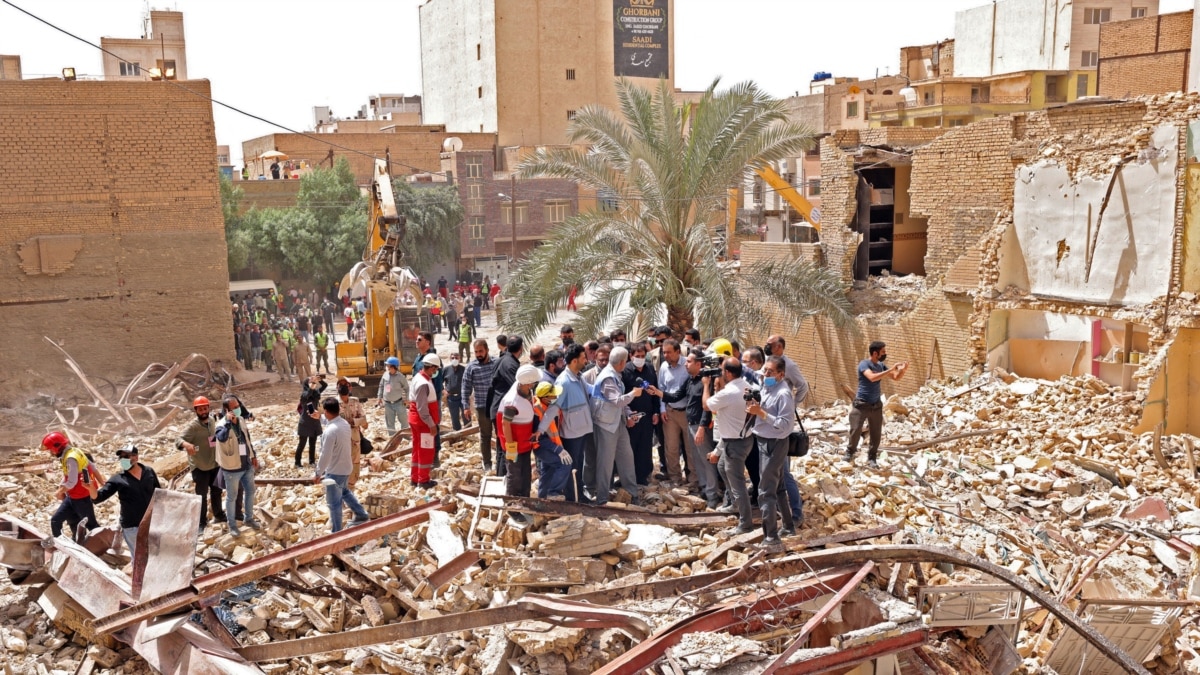
For the rubbles of these feeble houses / برای آوار خونه های پوشالی
At first glance, this line sounds like a symbolic reference to the collapsing authority of the Iranian government. It is likely that Hajipour is playing with words here and is referencing the regime’s shaky position . The original tweet, however, makesa more literal reference to actual houses collapsing and the rubble generated as a result. “for all the feeble houses that you built which collapsed on people’s heads during the past 40 years” is the tweet by Elham Nadaf. At the bottom of her post she has the hashtag #Metropol, a reference to a 10-story building which collapsed on May 23, 2022 in the city of Abadan in southwestern province of Khuzestan.
Aside from Metropol, building safety has been a controversial issue in Iran during the past few decades. Many major cities in Iran are located on earthquake fault lines. Government corruption, however, has resulted in construction companies not adhering to standard safety measures that would ensure less destruction and loss of life in case of an earthquake.
For the sake of having peace of mind / برای احساس آرامش
This line is very much connected to the earlier one about longing for an ordinary life, and also to what is mentioned a few lines down about insomnia and tranquilizers.
For the rising sun after a long-lasting night / برای خورشید پس از شبای طولانی
This line in the song matches the original tweet almost word by word. It describes the symbolic victory of light over darkness (good over evil) and is saying that the aims of, or one of reasons behind, the current uprising is to defeat darkness with light. The dichotomy of light and darkness has a very important place in Iranian culture. The longest night of the year, the winter solstice, is an important celebration in Iran, called Shab-e-Yalda, meant to celebrate the victory of sun, rising after the longest night of the year, over darkness.
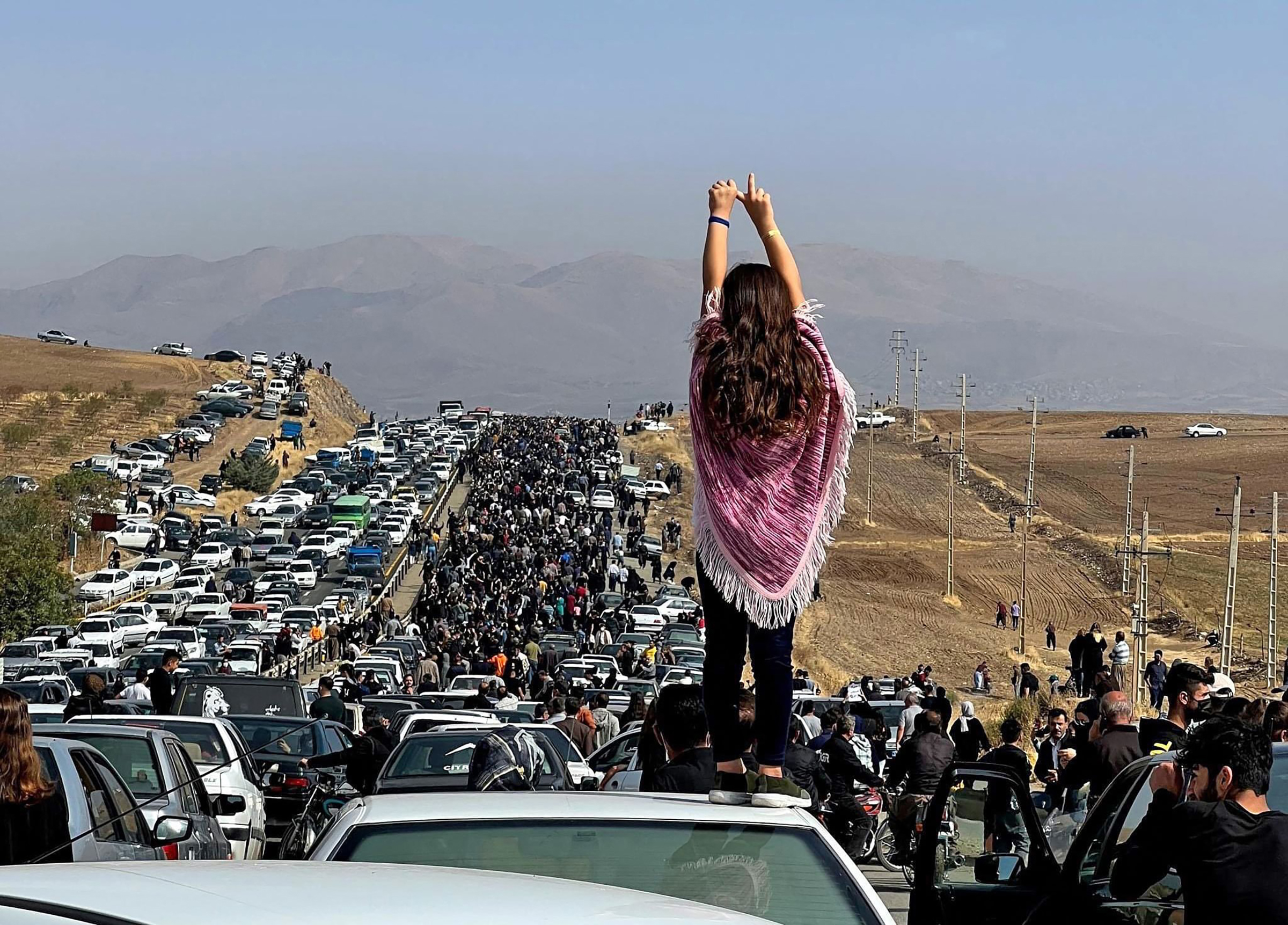
Because of the tranquilizers, because of insomnia / برای قرص های اعصاب و بی خوابی
This line is connected to what is implied in the earlier line “For the sake of having peace of mind.” In the absence of an ordinary life, many people have lost their peace of mind and have to deal with psychological problems and insomnia.
For man, homeland, prosperity / برای مرد، میهن، آبادی
The slogan “for man, homeland, prosperity” was developed as a companion to the original slogan of this movement, “Woman, Life, Freedom” during the early days of 2022 uprising. It received mixed feedback, for although some people saw it as a good companion for “woman, life, freedom” others argued that it will take the focus aways from women who are the center of this uprising. Arguments were also made regarding the patriarchal nature of this slogan which is something that this movement is fighting against. Nonetheless, the slogan has continued to appear alongside “women, life, freedom” as one of the slogans of this uprising.
Because of the girl who wished she was a boy / برای دختری که آرزو داشت پسر بود
Women in Iran are prevented from participating in certain activities and from entering certain locations. One of the most controversial examples of this is the unofficial ban, until very recently, on women entering stadiums to watch male athletes compete. As the result, many Iranian women have expressed their wish of having been born boys instead of girls and there are cases of women disguising themselves as men in order to avoid the mandatory hijab or other oppressive gender rules.
For woman, life, freedom / برای زن، زندگی، آزادی
This slogan became the main slogan of the protesters all over Iran. Zan, Zendegi, Azadi, has its roots in a Kurdish slogan Zhan, Zhian, Azadi, which became popular in the late 20th century through the advocacy of leaders such as Abdullah Öcalan, not just in the Kurdish areas of Iran but in all regions of greater Kurdistan.
Because of Freedom / برای آزادی
Although a lot of problems highlighted in this song have to do with mismanagement and corruption on part of the government, just as many issues, if not more,are the result of restrictions and limitations that are imposed on people in the name of religion or national interest. Therefore, “because of freedom” is in many ways the main reason why Iranians are protesting and as a mirror reflecting the current uprising, it makes perfect sense for this song to end by repeating “because of freedom” (Baraye Azadi) three times.

Baraye as a Unique Revolutionary Song
What catches one’s eye regarding these lyrics is that unlike the majority of the other revolutionary songs, especially those composed previously in Iran itself, this song is not about fighting, bravery, defeating the enemy, sacrificing one’s life for the cause, etc. Baraye is about everyday life; it is, as it says, about longing for an ordinary and prosperous life. It talks about environmental problems, animals that are going extinct, trees that are dying, refugee rights, and psychological concerns, alongside freedom, liberty, and prosperity. In order to clearly demonstrate how different this song is from other popular revolutionary songs in Iran, especially those from the 1979 Revolution, whether Islamic, leftist, or belonging to another ideology, it might be useful to take a quick look at one of these other revolutionary songs.
Bé Lāleyé Dar Khūn Khofté “To the Tulip Lying in Blood” was made right after the 1979 Revolution. It became very popular and is always broadcasted by TV and radio stations, in schools and universities, in order to commemorate the 1979 revolution during its 10 days of anniversary celebration from February 1st to February 11th each year. The first few lines of the song are as follows:
We swear by the bloody tulip
The martyr who has sacrificed his life
To his last scream, to his mother’s tears
To the moment he died, to his ripped heart,
To you, you martyr lying in your own blood
We swear that to our last breath, we will continue your path.
This song is all about death. It is glorifying death, idealizing the one who has already died and encourages everybody else to follow his path to their death. It is not talking about a good day which will come when we are all free, it talks instead about a day when we will die for the cause, because that is what we should do! A few lines down it says:
To our fellow warriors, who are suffering but are faithful.
To our fellow warriors who are tired but brave and are willing to sacrifice their lives,
We swear that we shall continue your path.
Here, dying for the cause, for an ideology, is perceived as the right thing to do. In comparison, Baraye is all about life. It is not encouraging anyone to fight to the death, seek martyrdom, or even fight at all physically. It is not idealizing and glorifying death or any type of physical violence. It is about life and, as it says on line 6, it is about “longing to have an ordinary life.”
Baraye is not about any ideology other than life itself and even freedom which is mentioned multiple times in this song is a very tangible kind of freedom, not an abstract one. It is the freedom to dance, freedom to kiss your lover in public, freedom to make personal choices away from government interference. It is reflecting the movement that started as a backlash against mandatory hijab. People want to be free to wear what they want to wear, to have bodily autonomy and to choose their own way of life. By citing specific, and yet common, problems that Iranians face in today’s Iran, this song has effectively captured the collective trauma that the Iranian nation is suffering.











